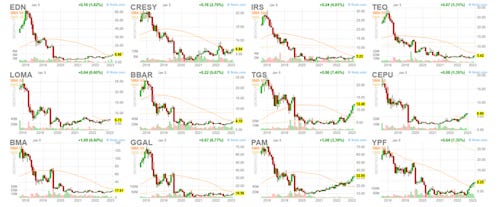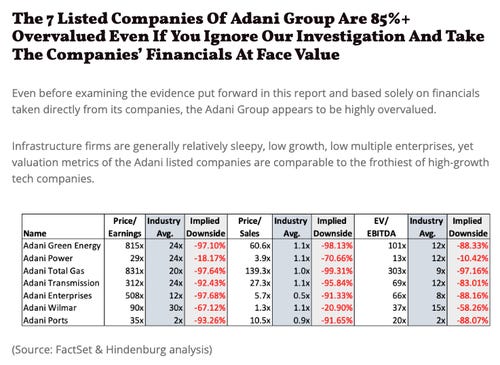Short seller Hindenburg Research is targeting India’s Adani Group (see the Wikipedia entry here) – the 2nd largest conglomerate in India owned by Gautam Shantilal Adani (the third richest man in the world and the richest man in Asia). This has the potential to get interesting (Hindenburg Research is best known for bringing down Trevor Milton – the founder of EV startup Nikola) as 7 key Adani listed companies have seen their stock prices “mysteriously” surge over the past 3 years – ranking them individually among the largest companies in India. Both Adani Enterprises and Adani Ports feature in India’s Nifty 50 index and 6 of the companies are included in the MSCI India Index.
Meanwhile, as I expected, there are signs Lula is trying to take Brazil down the path Chavez took Venezuela down. Lula has fired the Army chief (Chavez also purged the military near the beginning of his regime) and may now be taking a page out of Erdogan’s playbook in Turkey by questioning the need for an autonomous central bank. Needless to say, existing investors in Brazil need to start paying close attention and not to what the western business media is saying.
Capitalist Exploits also recently had these Finviz charts (here is a link to the Finviz Argentina stock screen and our full ADR list) in their newsletter, noting: “This is a classic bullish setup. We cannot find any bullish commentary on Argentina…”
Investors looking at Brazil might want to wait for a Lula regime to produce similar stock charts for Brazilian stocks (our Brazil ADR list).
Finally, someone has done a reality check about those Brazil-Argentina common currency stories (hint: its likely to be special drawing rights) the business media has been peddling.
Subscribe Now Via Substack
Suggested Reading
$ = behind a paywall
Capitalizing on USA-China Tensions (Stock Spotlight Substack)
- What to Avoid:
- Chinese companies with links to the military: Any company supplying equipment to the Chinese army is likely to be already under sanctions or will be in the future. It would make them un-investable for US citizens and corporations. This includes a lot of tech and AI companies.
- US-listed Chinese companies: delisting is an easy-to-implement threat and a good way to increase separations between the two economies. Investing in Chinese companies can be fine, but only for China-listed companies.
- US companies with more than 30% of revenues coming from China. US stocks whose price depends on growth coming from China are in the same situation.
- Taiwan-based companies: The island will be the focal point of two superpower rivalries. This means that we should see in the future some heightened tensions and a crisis of some sort that is likely to make investors panic and sell en mass. No matter how good the companies are, this is the same type of risk that investing in Ukraine or Russia in 2020-2021.
The Chinese Property Market: The Most Important Industry Globally Which Few Understand (Platinum Asset Management)
- A property implosion was 2022’s China crisis narrative. We have owned Chinese property companies, namely China Resources Land and China Overseas Land & Investment over the past year, which have performed well. The Chinese property sector provides an apt case study of the reverse of an asset price bubble.[1] Indeed, it looks to us like a good example of an “anti-bubble”.
- There is no evidence of any meaningful glut of properties in China.
Has there been malinvestment? Yes.
Is there evidence of a nationwide excess of housing units? No.
China: No Longer a ‘No-Brainer,’ But Still the Best of Emerging Markets (Institutional Investor)
- Eastspring believes the most attractively priced companies are in the renewables, hospitality, and smart infrastructure sectors, according to its 2023 outlook.
- “But today, the capital markets [in India] are very domestically driven. Many of the stocks in the market look expensively priced. So this is sort of a frustrating tradeoff between this very attractive long-term story [and] the short-term unattractive pricing of company,” [Andrew] Cormie [who leads Eastspring’s global emerging markets team] said.
- According to Cormie, some investors prefer the ex-China strategy. “But in our experience, that’s the minority rather than the majority,” he said. Most investors put money in the ex-China strategy because they want to be exposed to a more diversified basket of EM stocks, he added.
Short-Seller Hindenburg Targets India’s Richest Man For “Brazen Stock Manipulation” (Zero Hedge)
- Short seller Hindenburg Research, best known for publishing a scathing report on EV startup Nikola, which brought down the founder, is pursuing its biggest target yet: India’s richest man.
- Avinash Gorakshakar, head of research at Profitmart Securities, told Reuters that the slide in Indian stocks was due to a “combination of factors – the report on Adani group stocks, the monthly expiry of January derivatives series and the fading off of the pre-budget rally.”
Adani Group: How The World’s 3rd Richest Man Is Pulling The Largest Con In Corporate History (Hindenburg Research)
What is BharOS, the new mobile operating system made in India that wants to take on Android? (FirstPost)
- Developed by IIT Madras-incubated startup called JandKops, BharOS or BharatOS is a safer and more privacy-oriented, AOSP-based mobile operating system that plans to take on Android and iOS in India.
- Jitania Kandhari, deputy chief investment officer and head of macroeconomic research for emerging markets at Morgan Stanley Investment Management (IM), is pulling money out of U.S. stocks and refocusing on emerging markets like India and Vietnam.
- Kandahari also noted that as supply chains continue to shift out of China post-pandemic, emerging markets like India, Vietnam, and Mexico should benefit from increased business with the West.“Everything that is not working for China is working for India,” she said, arguing China is “at the eye of a de-globalization storm.”
Brazil’s Central Bank On The Verge Of Raising Its Inflation Target As It Spirals Into The Inflationary Abyss (Zero Hedge)
- So when President Luiz Inacio Lula da Silva, just three weeks into office, questioned the need for an autonomous central bank during a national TV interview last week, it didn’t go over well in markets… even if nobody was really surprised. Swap rates surged and the currency tanked following his remarks. Cabinet members entered the field and managed to halt the plunge that day, but the episode left many investors increasingly alarmed about a Lula presidency they are finding to be vastly different than the one that oversaw an economic boom back in the first decade of the new the century.
- Taking a page right out of Erdogan’s playbook (as a reminder, in Turkey the central bank has lost all of its autonomy in recent years as Turkey’s dictator appointed close friends and allies to run it under fear of immediate termination if they refuse to follow orders), Lula said that “there was a lot of discussion in this country to have an independent central bank, believing that it would be better,” (during Lula’s initial two terms in office, the bank’s chief, Henrique Meirelles, said the president had given him de-facto autonomy to set monetary policy). Lula then said that “it’s silly to think that an independent central bank governor is going to do more than when the president appointed him.”
- Vista Capital had flagged an attack on the central bank’s autonomy as a “relevant risk” being underestimated by markets in a note at the end of last year, but the topic became ubiquitous following the interview, with money managers now expecting the administration to force a change in Brazil’s inflation goals.
- What happens next? Look to Argentina for clues. As for all those
in the US deep state and assorted hanger-on billionaireswho backed Lula over Bolsonaro, they are following events in Brazil most closely, knowing well that once the inevitable economic crash pans out – as it does every time a socialist is in charge – it will be only a matter of time before they can buy up Brazil’s vast riches at pennies on the real.
No, Brazil and Argentina aren’t planning a South American version of the euro. Here’s what’s going on. (Market Watch via MSN)
- Trade between Brazil and Argentina is largely denominated in U.S. dollars. The problem is that Argentina doesn’t have much in the way of dollar reserves, so it has put in place a number of capital constraints, which has had a big impact on Brazilian exporters, de Bolle explained.
- The best comparison would be special drawing rights, or SDRs, the supplementary foreign-exchange reserve assets created and maintained by the International Monetary Fund, she said. The value of an SDR is based on a basket of international currencies.
Emerging Market Small Cap: Good Things Come In… (Man Group)
- Through this analysis, we highlight the potential benefits of EM Small Cap strategies, including:
- Portfolio diversification compared with larger-cap EM strategies;
- Balanced EM country/sector composition, which we believe is particularly important in managing EM’s concentration in Asia;
- Greater exposure to domestic-demand growth and, on average, lower exposure to foreign revenue sources;
- Historically lower volatility with better returns relative to the MSCI EM Index;
- The potential to outperform the benchmark, supported by active managers’ historical performance and market inefficiencies.
The Chandler Brothers: The Greatest Investors You’ve Never Heard Of (Macro Ops)
- They ran the Sovereign Global Fund for 20-years (the two have since split off to manage their own money with Legatum and Clermont Capital).
- They were amongst the first investors to plunge into emerging markets like Russia, Brazil, and the Czech Republic. They are sons of a WWII veteran who ran a beekeeping business with Edmund Hillary (yes, that Edmund Hillary), before starting what became New Zealand’s most upscale department store.
- At the time, Brazil’s hyperinflation had rendered earnings and P/E ratios absolutely meaningless. So they had to turn to “creative metrics — in this case, market capitalization per access line. Telebras, the nation telephone monopoly, was trading at about $200 per line, compared with $2,000 for Mexico’s Teléfono de México and an average cost of $1,600 for installing a line in Brazil.
- The brothers also prize scale, believing that the way to achieve outsize returns is to make a few big bets — Sovereign usually holds fewer than ten stocks — rather than manage a diverse portfolio. The Chandlers favor large-cap stocks in big countries. “If you are invested in big companies in big countries, that means there is a ready audience of benchmark-following investors who must buy the asset,” says Richard. “By buying big — going narrow and deep, as opposed to diversifying — you maximize your success.“
- Sovereign usually holds fewer than ten equity positions at any one time. Though it typically holds its larger positions for two to five years, the firm regularly trades in and out of some stocks to test the waters and take advantage of price movements.
Animated Chart: Remittance Flows and GDP Impact By Country (Visual Capitalist)
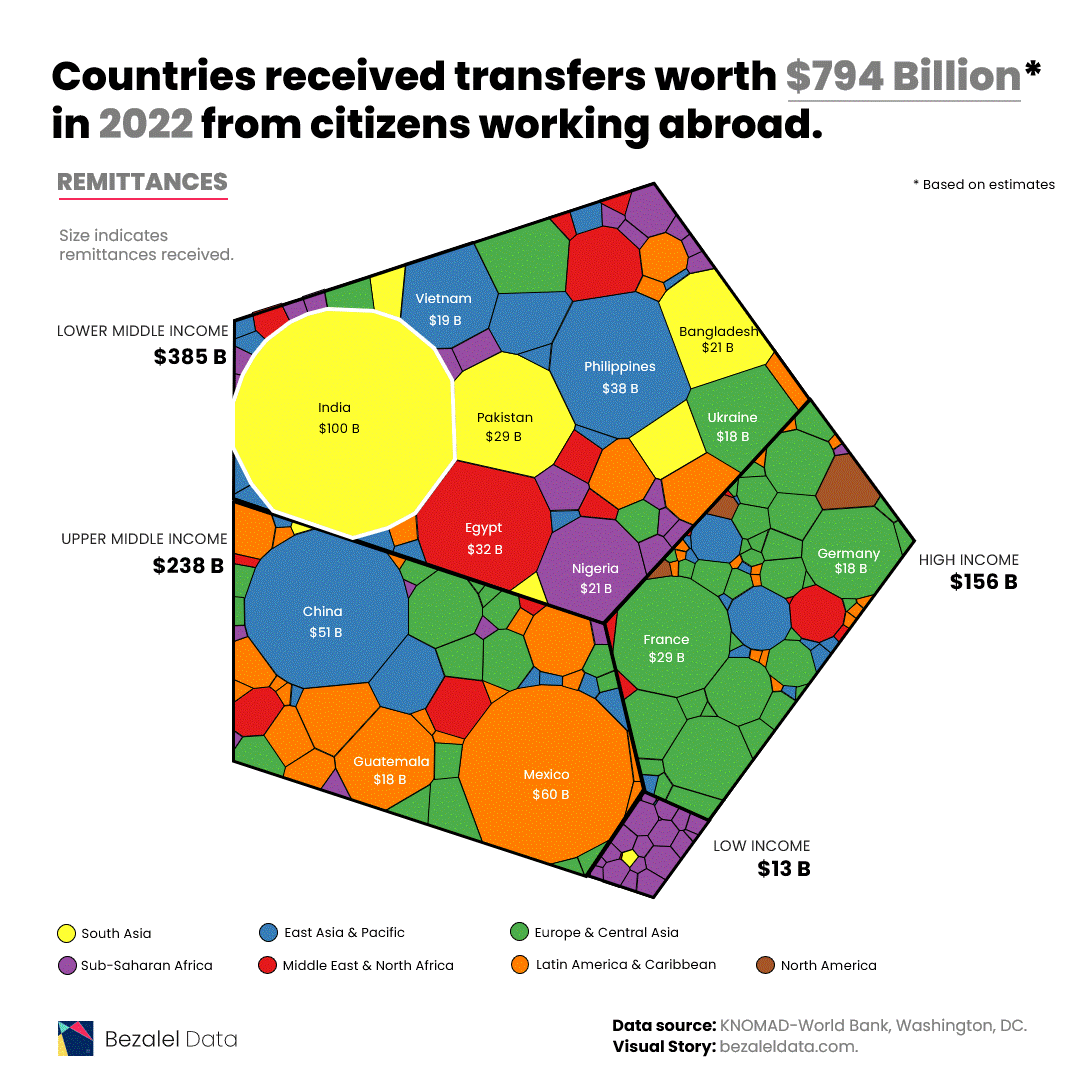
Earnings Calendar
Note: Investing.com has a full calendar for most global stock exchanges BUT you may need an Investing.com account, then hit “Filter,” and select the countries you wish to see company earnings from. Otherwise, purple (below) are upcoming earnings for US listed international stocks (Finviz.com):
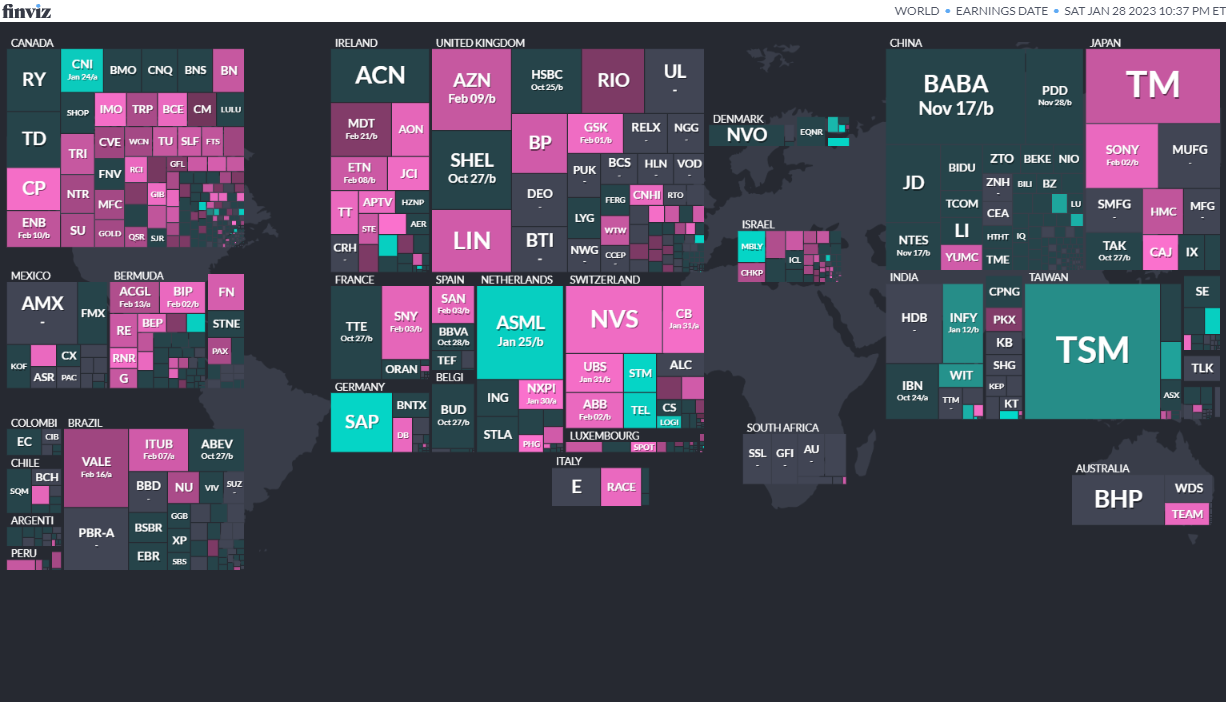
Economic Calendar
Click here for the full weekly calendar from Investing.com containing frontier and emerging market economic events or releases (my filter excludes USA, Canada, EU, Australia & NZ).
Election Calendar
Frontier and emerging market highlights (from IFES’s Election Guide calendar):
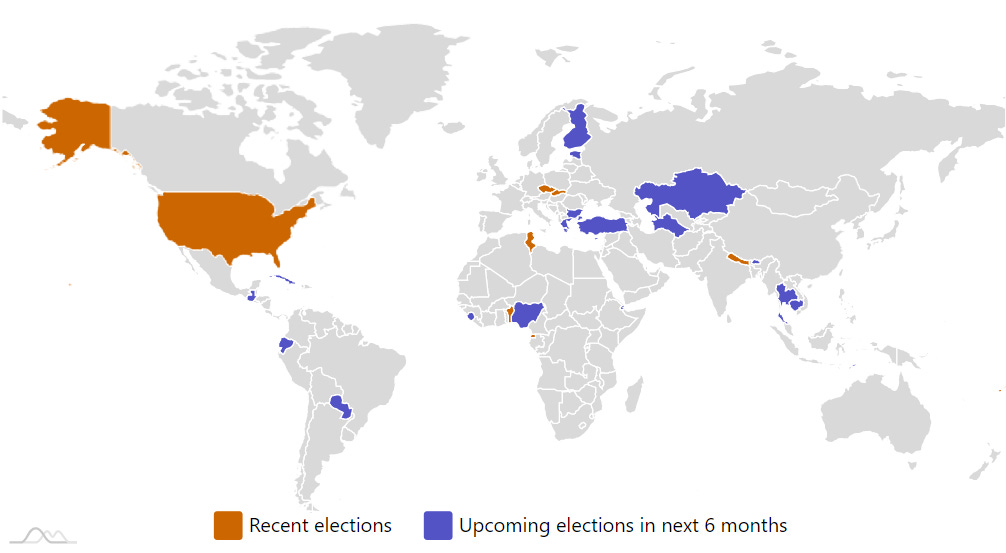
SlovakiaReferendumJan 21, 2023 (t) Confirmed Feb 7, 2015CzechiaPresidentJan 27, 2023 (d) Confirmed Jan 26, 2018- Cyprus President Feb 5, 2023 (d) Confirmed Feb 4, 2018
- Ecuador Referendum Feb 5, 2023 (t) Confirmed Feb 4, 2018
- Nigeria Nigerian House of Representatives Feb 25, 2023 (d) Confirmed Feb 23, 2019
- Nigeria Nigerian Senate Feb 25, 2023 (d) Confirmed Feb 23, 2019
- Nigeria President Feb 25, 2023 (d) Confirmed Feb 23, 2019
- Djibouti Djiboutian National Assembly Feb 28, 2023 (t) Date not confirmed Feb 23, 2018
- Estonia Estonian Parliament Mar 5, 2023 (d) Confirmed Mar 3, 2019
- Turkmenistan Turkmen National Assembly Mar 31, 2023 (t) Date not confirmed Mar 25, 2018
- Paraguay Presidency of Paraguay Apr 30, 2023 (d) Confirmed Apr 22, 2018
- Paraguay Paraguayan Chamber of Deputies Apr 30, 2023 (d) Confirmed Apr 22, 2018
- Kazakhstan Kazakh House of Representatives Apr 30, 2023 (t) Date not confirmed Jan 10, 2021
- Thailand Thai House of Representatives May 7, 2023 (t) Date not confirmed Mar 24, 2019
- Greece Greek Parliament Jun 8, 2023 (t) Date not confirmed Jul 7, 2019
IPO Calendar/Pipeline
Frontier and emerging market highlights from IPOScoop.com and Investing.com (NOTE: For the latter, you need to go to Filter and “Select All” countries to see IPOs on non-USA exchanges):

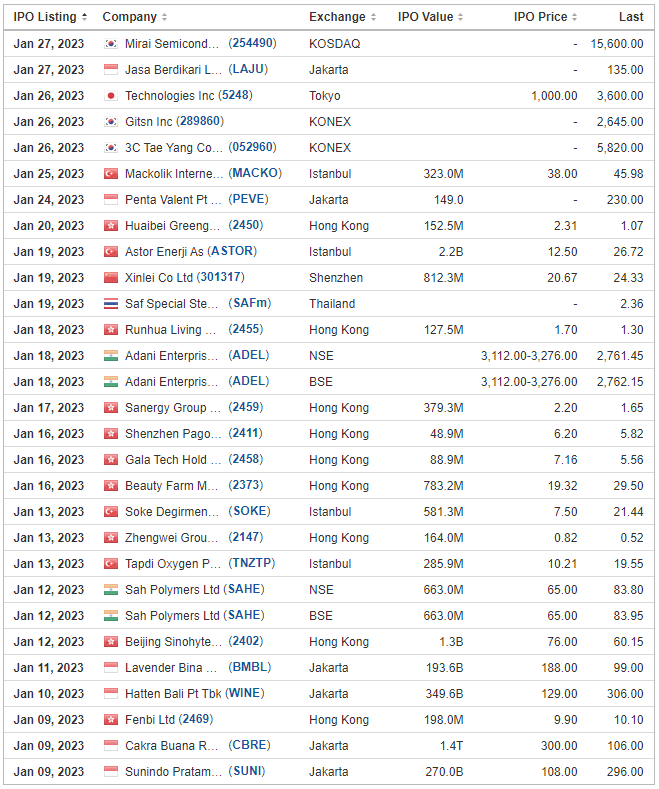
Lichen China Ltd.LICN, 4.5M Shares, $4.00-4.00, $18.0 mil, 2/1/2023 Wednesday
- We are a leading financial and taxation service provider in China in terms of revenue, according to the industry report of Frost & Sullivan. (Incorporated in the Cayman Islands)We have operated as a dedicated financial and taxation solution service specialist in China for over 17 years. We focus on providing (i) financial and taxation solution services; (ii) education support services; and (iii) software and maintenance services in the People’s Republic of China (PRC) under the “Lichen” brand. With over 17 years of operation history, we have gained substantial experience and established a solid reputation with our proven track record in the PRC.We launched a new business line of software and maintenance services in 2019 to expand our software product offerings to enterprise customers, universities, colleges and educational institutes and have started to generate revenue from provision of such services since then.From 2012 to 2020, we have been recognized as one of the Top 50 Providers of Management Consulting Services in China for eight consecutive years by the China Enterprise Confederation Management Advisory Committee.Note: Revenue and net income are in U.S. dollars for the year ended Dec. 31, 2021.(Note: Lichen China filed an F-1/A dated Jan. 12, 2023, in which it cut the size of its IPO to 4.5 million Class A ordinary shares – down from 6.25 million ordinary shares – and kept the assumed IPO price at $4.00 to raise $18 million. That represents a 28 percent cut in the deal’s size. Background: Lichen China’s IPO was delayed last September; the pricing had been expected during the week of Sept. 19, 2022, for a trade date likely on Friday, Sept. 23, or Monday, Sept. 26, 2022.)
Elephant Oil Corp.ELEP, 1.8M Shares, $4.15-5.15, $8.5 mil, 2/2/2023 Thursday
- (Note: Elephant Oil Corp. filed an S-1/A on Dec. 6, 2022, to cut the size of its unit IPO – to 1.83 million units (1,827,957 units) from 2.58 million units (2,580,645 units) – and kept the price range at $4.15 to $5.15 – to raise $8.5 million. In terms of estimated IPO proceeds, the new terms represent a cut of 29.2 percent. Each unit consists of one share of common stock and one warrant to buy one share of stock. **Note: The company updated its IPO plans with a placeholder filing dated Jan. 6, 2023. Background: The IPO’s initial terms were 3.23 million units at $4.15 to $5.15, disclosed in an S-1/A filing on Aug. 12, 2022. The S-1 was filed March 25, 2022. Confidential IPO documents were filed on Dec. 21, 2021.)We are an independent oil and gas exploration stage company, led by an experienced management and technical team, which is focused on under-explored regions in Africa. Our current asset portfolio includes an exploration license onshore in the Republic of Benin (“Benin”), as well as an exploration license onshore in the Republic of Namibia (“Namibia”). As of the date of this prospectus, we have not drilled any wells. Additionally, the Company continues to review other potential assets for expansion.**Note: Revenue and net loss figures are for the year that ended June 30, 2022.
EM ETF Launches
Climate change and ESG are clearly the latest flavours of the month for most new ETFs. Nevertheless, here are some new frontier and emerging market focused ETFs:
- 12/13/2022 – Virtus Stone Harbor Emerging Markets High Yield Bond ETF VEMY – Active, fixed income, junk bond, emerging markets
- 9/22/2022 – WisdomTree Emerging Markets ex-China Fund XC – Passive, equity, emerging markets
- 9/15/2022 – KraneShares S&P Pan Asia Dividend Aristocrats Index ETF KDIV – Passive, equity, Asia, dividend strategy
- 9/15/2022 – OneAscent Emerging Markets ETF OAEM – Active, Equity, emerging markets, ESG
- 9/9/2022 – Emerge EMPWR Sustainable Select Growth Equity ETF EMGC – Active, equity, emerging markets
- 9/9/2022 – Emerge EMPWR Unified Sustainable Equity ETF EMPW – Active, equity, emerging markets
- 9/8/2022 – Emerge EMPWR Sustainable Emerging Markets Equity ETF EMCH – Active, equity, emerging markets, ESG
- 7/14/2022 – Matthews China Active ETF MCH – Active, equity, China
- 7/14/2022 – Matthews Emerging Markets Equity Active ETF MEM – Active, equity, emerging markets
- 7/14/2022 – Matthews Asia Innovators Active ETF MINV – Active, equity, Asia
- 6/30/2022 – BondBloxx JP Morgan USD Emerging Markets 1-10 Year Bond ETF XEMD – Passive, fixed income, emerging markets
- 5/2/2022 – AXS Short CSI China Internet ETF SWEB – Active, inverse, thematic
- 4/27/2022 – Dimensional Emerging Markets High Profitability ETF DEHP – Active, equity, emerging markets
- 4/27/2022 – Dimensional Emerging Markets Core Equity 2 ETF DFEM – Active, equity, emerging markets
- 4/27/2022 – Dimensional Emerging Markets Value ETF DFEV – Active, equity, emerging markets
- 4/27/2022 – iShares Emergent Food and AgTech Multisector ETF IVEG – Passive, equity, thematic [Mostly developed markets]
- 4/21/2022 – FlexShares ESG & Climate Emerging Markets Core Index Fund FEEM – Passive, equity, ESG
- 4/6/2022 – India Internet & Ecommerce ETF INQQ – Passive, equity, thematic
- 2/17/2022 – VanEck Digital India ETF DGIN – Passive, India market, thematic
- 2/17/2022 – Goldman Sachs Access Emerging Markets USD Bond ETF GEMD – Passive, fixed income, emerging markets
- 1/27/2022 – iShares MSCI China Multisector Tech ETF TCHI – Passive, China, technology
- 1/11/2022 – Simplify Emerging Markets PLUS Downside Convexity ETF EMGD – Active, equity, options strategy
- 1/11/2022 – SPDR Bloomberg SASB Emerging Markets ESG Select ETF REMG – Passive, equity, ESG
EM ETF Closures/Liquidations
Frontier and emerging market highlights:
- 12/28/2022 – Franklin FTSE Russia ETF – FLRU
- 12/22/2022 – VictoryShares Emerging Market High Div Volatility Wtd ETF CEY
- 8/22/2022 – iShares MSCI Argentina and Global Exposure ETF AGT
- 8/22/2022 – iShares MSCI Colombia ETFI COL
- 6/10/2022 – Infusive Compounding Global Equities ETF JOYY
- 5/3/2022 – ProShares Short Term USD Emerging Markets Bond ETF EMSH
- 4/7/2022 – DeltaShares S&P EM 100 & Managed Risk ETF DMRE
- 3/11/2022 – Direxion Daily Russia Bull 2X Shares RUSL
- 1/27/2022 – Legg Mason Global Infrastructure ETF INFR
- 1/14/2022 – Direxion Daily Latin America Bull 2X Shares LBJ
Check out our emerging market ETF lists, ADR lists (updated) and closed-end fund (updated) lists (also see our site map + list update status as some ETF lists are still being updated as of Summer 2022).
I have changed the front page of www.emergingmarketskeptic.com to mainly consist of links to other emerging market newspapers, investment firms, newsletters, blogs, podcasts and other helpful emerging market investing resources. The top menu includes links to other resources as well as a link to a general EM investing tips / advice feed e.g. links to specific and useful articles for EM investors.
Disclaimer. The information and views contained on this website and newsletter is provided for informational purposes only and does not constitute investment advice and/or a recommendation. Your use of any content is entirely at your own risk and it is your sole responsibility to evaluate the accuracy, completeness and usefulness of the content. Seek a duly licensed professional for any investment advice. I may have positions in the investments covered. This is not a recommendation to buy or sell any investment mentioned.
Emerging Market Links + The Week Ahead (January 30, 2023) was also published on our Substack.
Emerging Markets Investing Tips + Advice
Emerging Market Skeptic (Website)
Website List Updates + Site Map
Stocktwits @EmergingMarketSkptc
Similar Posts:
- Emerging Market Links + The Week Ahead (February 13, 2023)
- Sleeping Giants – The Case for Emerging Markets (Robeco Webinar)
- Emerging Market Links + The Week Ahead (October 3, 2022)
- Emerging Market Links + The Week Ahead (June 27, 2022)
- Emerging Market Links + The Week Ahead (November 21, 2022)
- Emerging Market Links + The Week Ahead (October 10, 2022)
- The Financial History of Emerging Markets: New Indices
- Emerging Market Links + The Week Ahead (January 23, 2023)
- Emerging Market Links + The Week Ahead (August 8, 2022)
- Emerging Market Links + The Week Ahead (June 6, 2022)
- Emerging Market Links + The Week Ahead (August 1, 2022)
- Emerging Market Links + The Week Ahead (October 24, 2022)
- Emerging Market Links + The Week Ahead (September 5, 2022)
- Emerging Market Links + The Week Ahead (August 29, 2022)
- Emerging Market Links + The Week Ahead (September 19, 2022)
